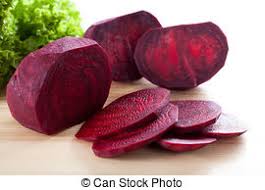Though initially grown by Romans, Beetroot has spread across the world today. It is one of the many Beta Vulgaris plants of the Amaranthaceae family. One of its many varieties, is sugar beet which is used for producing table sugar. In Indian homes, beetroot is usually consumed as a vegetable or salad item. Being full of many medicinal properties and health benefits, beetroot is also a remarkable natural blood pressure lowering food. If you have high blood pressure, then consider making beetroot part of your regular diet, but make sure that don’t add salt to it. By adding salt, you can rob it off its BP lowering properties.

Beetroot
Beetroot plant grows to a maximum height of 1-2 meters. Its leaves are usually 5-20 cm long and are heart shaped. In addition to the most popular red variety, beetroot is also available in deep red-purple, white and yellow color. White beetroot is used for producing sugar whereas red beet is used for vegetable. Leaf beat or chard is one of its verities, which has been used as medicine by alternative health practitioners for centuries.
Low Calorie Food Beetroot
With very small amount fat and low calorie content, beetroot makes for a perfect health diet for those looking to lose weight. Full of phytochemical compound known as glycine betaine, beetroot works wonders for overall cardio vascular health. Being a rich source of B Complex Vitamins, folate and minerals such as iron, magnesium and potassium, it helps human body perform many body functions effectively.
Beetroot Health Benefits
- Improves digestion and relives constipation
- Lowers glucose levels and helps in diabetes management
- Lower blood pressure
- Improves heart health
- Helps in fat absorption and reduces chronic inflammation
- It speeds up muscle oxygenation that results in high athletic performance
- Romans believed it to be an aphrodisiac because it improves blood circulation in genitals, and boosts your sex drive and performance.
Usage of Beetroot
Used as a common vegetable in many parts of the world, beetroot has an important place in Asian especially Indian kitchens and homes.
- Use beetroot as salad
- Have Beetroot juice regularly if you suffer from hypertension
- Use beetroot as a food coloring agent
- Enjoy beetroot pickle available in various forms and flavours
- Use white variety for sugar production (At commercial level of course, not at home)
- It is also used in making rum like distilled spirit
Agricultural surplus of sugar beet is also used to produce bio-butanol fuel in the UK. In order to produce 1 kg of this fuel, 6.22 kg of sugar beet is processed.
Beetroot Side Effects
Though there are no side effects of this natural herb, excess consumption may result in pink color urine or stool, which is completely harmless. Also beet greens and also the root contains oxalate which may be harmful for those who have been diagnosed with oxalate-containing kidney stones. As a general rule, you cannot depend on beetroot alone for all the health benefits. It should be a part of diet and not a substitute of meal either in the form of salad or vegetable. Therefore consume it in moderation and it will work like a super food.
You may also be interested in
